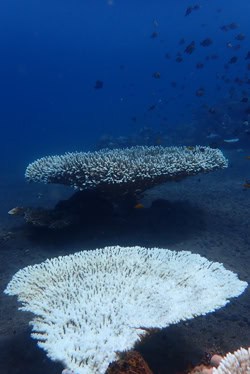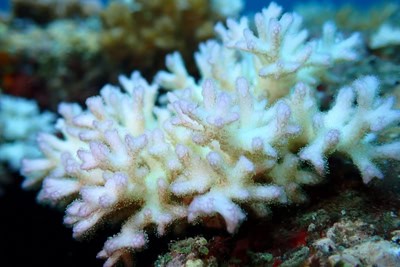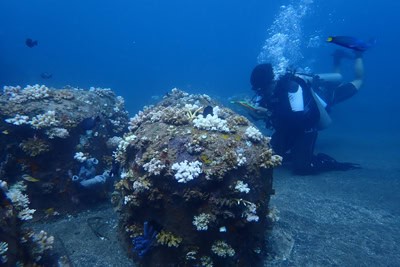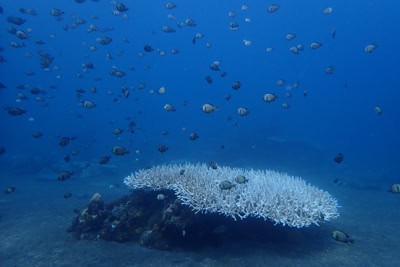
Images: taken at Bondalem’s Locally Managed Marine Area, Bondalem Village, Bali, Indonesia by Derta Prabuning – Reef Check Indonesia
Earlier this month, NOAA and ICRI (of which Reef Check is a member) confirmed that the world is currently experiencing its fourth global coral bleaching event and its second in the last 10 years. A copy of the full press release is below.
Previous events occurred in 1998, 2010, and 2015, and Reef Check teams around the world have been able to document each event as they unfolded. This current event has been no exception; Reef Check chapters share their observations here:
Reef Check Dominican Republic
“NOAA recently declared the fourth global massive coral bleaching event, with the Dominican Republic significantly impacted. In 2023, we observed that over 90% of coral colonies bleached as water temperatures soared above 30 degrees Celsius, peaking at 32 degrees during the late summer months. Witnessing our reefs turn ghostly white was alarming. However, by winter and spring, the reefs had regained their normal hues, and temperatures settled at a new normal of 27 degrees Celsius. We are now assessing the survival and mortality of our coral populations to understand their adaptation to these conditions and to inform more effective conservation strategies.” – Ruben Torres, President
Reef Check Malaysia
“Reef Check Malaysia has been monitoring this bleaching event as it unfolded over the last few months, using data from NOAA. In February, we started planning a monitoring program, including training local teams to monitor the onset, spread, duration and impact of the bleaching event. We wanted to get better data on the impact. We are now conducting regular bleaching monitoring surveys, based on the Reef Check standard survey methodology. We have reports of up to 20% bleaching in some areas.” – Julian Hyde, CEO
Reef Check Indonesia
“This bleaching season is unique and of course, the worst has already taken place in November – December 2023. These months are known as the rainy season in Indonesia’s archipelago, but bleaching occurs. Based on network reports, in November – December, bleaching took place in Karimunjawa Island, North Sulawesi, Bali, West and East of Nusa Tenggara, Raja Ampat, and several other places in Indonesia.
Reef Check Indonesia works closely with the Ministry of Marine Affairs and Fisheries, through the Director of Ecosystem and Aquatic Biota Conservation, to provide monitoring advice to the network so that coral bleaching monitoring can be monitored effectively and efficiently.
Now, we are preparing to release the previous bleaching report (November 2023 – January 2024) and monitoring advice for a bleaching alert in the middle of 2024 (June – July). We hope that bleaching does not occur, but if it takes place, we are ready.” – Derta Prabuning, Executive Director



ICRI Press Release
NOAA and ICRI Confirm Fourth Global Coral Bleaching Event
WASHINGTON D.C (Monday 15th April 2024) – The world is currently experiencing its fourth global coral bleaching event, according to NOAA scientists and ICRI’s network of global coral reef scientists, the second in the last 10 years.
Bleaching-level heat stress, caused by prolonged increases in anomalous ocean temperatures, as remotely monitored and predicted by NOAA’s Coral Reef Watch (CRW), has – and continues to be – extensive across the Atlantic, Pacific, and Indian Oceans.
“From February 2023 to April 2024, significant coral bleaching has been documented in both the Northern and Southern Hemispheres of each major ocean basin,” said Derek Manzello, Ph.D., NOAA CRW coordinator.
Mass bleaching of coral reefs, since early 2023, has been confirmed in at least 53 countries, territories, and local economies, including Florida (U.S.A), the Caribbean, the Eastern Tropical Pacific (including Mexico, El Salvador, Costa Rica, Panama, and Colombia), Australia’s Great Barrier Reef, large areas of the South Pacific (including Fiji, Vanuatu, Tuvalu, Kiribati, and the Samoas), the Red Sea (including the Gulf of Aqaba), the Persian Gulf, and the Gulf of Aden.
Bleaching must be confirmed within each Ocean basin to make a final determination of a global bleaching event. Reports have now been confirmed of widespread bleaching across parts of the Western Indian Ocean, including Tanzania, Kenya, Mauritius, the Seychelles, Tromelin, Mayotte, and off the western coast of Indonesia.
“As the world’s oceans continue to warm, coral bleaching is becoming more frequent and severe,” Manzello said. “When these events are sufficiently severe or prolonged, they can cause coral mortality, which can negatively impact the goods and services coral reefs provide that people depend on for their livelihoods.”
Where coral bleaching results in mortality, especially on a widespread scale, it impacts economies, livelihoods, food security, and more. However, it is important to remember that coral bleaching does not always lead to coral death. Rather, if the stress driving the bleaching diminishes, corals can recover, with reefs maintaining their biodiversity and continuing to provide the ecosystem services that we rely on.
“Climate model predictions for coral reefs have been suggesting, for years, that bleaching impacts would increase in frequency and magnitude as the oceans warm,” said Jennifer Koss, director of NOAA’s Coral Reef Conservation Program (CRCP).
This global event requires global action. The International Coral Reef Initiative (ICRI), a partnership of 101 international members, currently co-chaired by NOAA and the US Department of State, is steadfast in applying resilience-based management actions for coral reefs. In response to the three previous global bleaching events as well as regional and local events, ICRI and its members have advanced coral interventions and restoration in the face of climate change. ICRI develops, and shares, best practices for the effective management of coral reefs through the implementation of its Plan of Action.
NOAA has incorporated resilience-based management practices, increasing the emphasis on coral restoration, into its 2018 strategic plan, and funded a National Academies of Sciences’ study, leading to the publication of the 2019 Interventions to Increase the Resilience of Coral Reefs.
Koss said: “We are on the frontlines of coral reef research, management, and restoration, and are actively and aggressively implementing the recommendations of the 2019 Interventions Report.”
The 2023 heatwave in Florida (U.S.A) was unprecedented; starting earlier, lasting longer, and with recorded temperatures higher than any previous event in the region. During the heat stress event, NOAA deployed the 2019 recommended interventions, building a valuable knowledge base and made significant strides, through its “Mission: Iconic Reefs program”, to offset some of the negative impacts of global climate change and local stressors on Florida’s corals including moving coral nurseries to deeper, cooler waters and deploying sunshades to protect corals in other areas.
Global bleaching events do not affect all coral reefs equally and require a suite of global, regional, and local interventions. This emphasizes the importance of regularly monitoring coral reef ecosystems and not just during bleaching events. Networks such as the Global Coral Reef Monitoring Network, an operational network of ICRI, and the US Coral Reef Task Force, provide mechanisms for reporting on the impact of bleaching on the World’s coral reefs, alongside regional bleaching observation networks.
To share key messages and resources about coral bleaching, its impacts, causes and solutions currently being implemented and developed, ICRI has developed the “Coral Bleaching Hub” to support responses, policy and planning, and encourage global cooperation.
ICRI will be hosting a webinar on Tuesday 14th May 2024 to present and discuss the status of the 4th Global Bleaching Event, and the role of the global coral reef community. Register your interest to attend the webinar here.
 Subscribe to Newsletter
Subscribe to Newsletter Donate
Donate Shop
Shop 0
0









